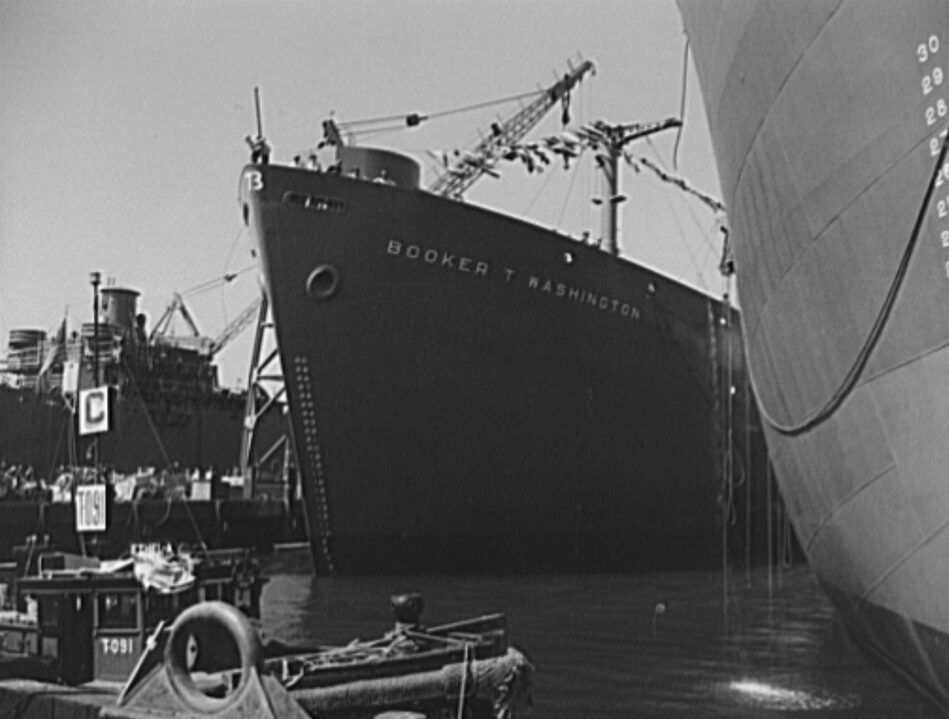Andy Bevan delves into two books exploring the history of America’s first Black master mariner, Captain Hugh Mulzac.
These two books, perhaps originally written with different readerships in mind, nevertheless have a unity about them: they both feature a remarkable Caribbean seaman and civil rights champion of the early twentieth century – and strong connections with Wales, which we should know more about and celebrate more widely.
The first, Revolutionary Lives of the Black Atlantic since 1917, is a carefully curated volume of essays on people of the African diaspora whose life stories wove them into the narratives of the Black and Red Atlantic after 1917. They include names already known well in Wales, particularly Paul Robeson, whose decades of civil rights struggle made him an icon and a comrade of the South Wales miners from the 1930s to the 1960s. But there are many others featured in the chapters of this book – each written by different, specialist academic authors – whose stories are just as illuminating, including Hubert Henry Harrison, Wilfred Domingo, Grace P Campbell, Lamine Senghor, C.L.R. James and Walter Rodney.
Significantly, though, the activist who is given pride of place in the editors’ introduction is Captain Hugh Mulzac. Born on Union Island in St Vincent in 1886, he eventually became the first black Master of a US Merchant Marine vessel, the Liberty ship SS Booker T Washington, in 1943. He first set foot in Wales in 1907. Approaching his twenty-first birthday, he made his first trans-Atlantic sea voyage, from Barbados to London, via Wilmington, North Carolina, that year, and then travelled to Cardiff – known as a port ‘open’ to black seafarers, to find a new vessel.
Asked to become master of an all-Black crew… Mulzac refused to be Master of a ‘Jim Crow vessel’. He won his argument and became captain of an integrated and famously anti-racist, anti-fascist crew
By 1909 he was back in Wales, studying for eight weeks at a school of Navigation and Seamanship in Swansea (probably Captain W.L. Dixon’s School at 20 Wind Street) to prepare for his Board of Trade Second Mate’s Certificate, which he passed with flying colours.
A Star to Steer By, Mulzac’s own autobiography, tells us a great deal more: about a remarkable life of principles put into practice and a deep sense of humanity. There are real highlights for a Welsh reader in this rip-roaringly told seafarers’ tale.
When Hugh Mulzac arrived back in Wales, in the late summer or early autumn of 1909, he tells us: ‘In Swansea, I grabbed a taxi and when the driver learned where I was from he told me he had a good West Indian friend. Since I needed a place to stay, his friend might take me in… And the taxi driver took me to Bill Boyd, who was not only a West Indian but a native of St Vincent.’
Innovative. Informed. Independent.
Your support can help us make Wales better.
After study, Mulzac worked on British-registered vessels for a few years and on US-registered ships during the war, taking US citizenship in 1918. Qualified Black seafarers were excluded from officers’ roles after the war, though, and Mulzac was compelled to accept cooks’ and stewards’ positions for most of the 1920s and 1930s, while campaigning for unified multi-racial labour unionism.
In 1942, a new world war and his own persistence led to his being offered the opportunity to captain the first US Liberty ship to be named after an Afro-American, the SS Booker T Washington. Originally asked to become master of an all-Black crew, in line with US notions of segregation, Mulzac refused to be Master of a ‘Jim Crow vessel’. He won his argument and became captain of an integrated and famously anti-racist, anti-fascist crew.
In January 1943, the Booker T put into Cardiff Docks for seven weeks. Mulzac tells us: ‘[W]e were unprepared for the welcome accorded us at Cardiff… As we pulled into the dock we heard happy cries, “Welcome Booker T Washington!”… Waiting for us were 40 or more colored [sic] Red Cross girls from London, Bristol, Liverpool and Southampton, plus a squad of reporters, photographers and Admiralty dignitaries. Everyone was invited aboard for a party that rocked the waterfront. The following day there were page-one stories and photographic coverage in all the Cardiff papers, and the dock workers and townspeople seemed to have no other topic than our arrival… A few days after our arrival someone noticed that several Cardiff theatres were advertising a newsreel on the Booker T Washington… The films were widely shown throughout the Commonwealth.’
After the war, Mulzac continued to be active in multi-racial maritime unionism and stood for election as Borough President in Queens, New York City, as a candidate of the American Labor Party. Needless to say, he became embroiled, campaigning alongside fellow activists including Paul Robeson, in the McCarthyism investigations of the early 1950s.
As well as drawing attention to two absorbing reads, this review also gives the opportunity to make an appeal through the pages of the welsh agenda for colleagues in Welsh academia to seek out more information about Mulzac and his Welsh connections. Equally, it may publicise the call for new clues about Bill Boyd in the Swansea of 1909, for our Cardiff Bay community activists and Welsh filmmakers to find out more about those remarkable seven weeks in 1943 – and perhaps to help find surviving visual and oral evidence of the Booker T’s visit, the newsreels and local press coverage.
All articles published on the welsh agenda are subject to IWA’s disclaimer. If you want to support our work tackling Wales’ key challenges, consider becoming a member.





